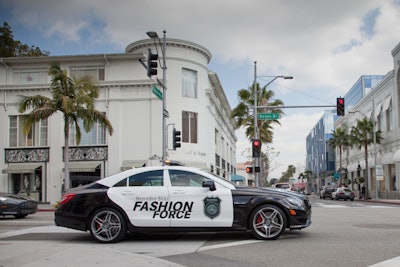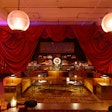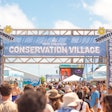
When it comes to sponsorship marketing, Mercedes-Benz gives other brands on this list a run for their money, supporting a breadth of large events like the U.S. Open tennis tournament, the P.G.A. Championship, collector car show Pebble Beach Concours d’Elegance, and Fashion Weeks in New York, Miami, Berlin, and Australia. Fully integrated into its overall strategy, these long-term partnerships allow the internal U.S. events team—led by manager of brand experience marketing Lisa Holladay—and its agency partners to place its luxury automobiles in front of a wide audience and experiment with creative and often playful ways to engage new and existing customers.
At New York Fashion Week in February 2011, the team rolled out a promotion called the “Fashion Force,” where stylist and Bravo TV personality Brad Goreski and a team of industry bloggers rode around in a specially decorated four-door coupe, offering free rides and show passes to people they deemed stylish. Later that month the initiative traveled to Hollywood for the Oscars, distributing invitations to a viewing party of the awards ceremony. Mercedes-Benz revisited and revamped the concept for the September edition of Fashion Week, using an S.U.V. and pack of “fashion rangers” to drive awareness physically and digitally.
The car company also leveraged its alliance with the James Beard Foundation to create a promotional lounge at the 2011 James Beard Awards. Dubbed the “Victory Lane Suite” and decorated with road markings, the space served as a rest stop—and photo op—for winning chefs.
Most notable is the stronger emphasis Mercedes-Benz has placed on social media activations recently, tinkering with experiential ways to incorporate Twitter, Facebook, and other platforms at a time when most companies are only just starting to explore the technology.
One of the first was the seven-week “Tweet Race” designed to accompany the carmaker’s first Super Bowl ad. In what Mercedes-Benz USA’s vice president of marketing, Stephen Cannon, called a “strategic leap of faith,” the buzz-building campaign in 2011 involved four two-person teams driving across the country to Dallas, earning points by using Twitter to gather followers and complete challenges on the road. To add momentum, each team was assigned a Twitter-savvy celebrity—Serena Williams, Pete Wentz, New York Yankees outfielder Nick Swisher, and hip-hop’s Reverend Run—as a “coach” and the supporters could win trips to one of the events the brand sponsors. The results were impressive: The Tweet Race had almost 30,000 active participants, boosted the number of Facebook fans by nearly 300 percent, and gathered some 77,000 Twitter followers.
Equally as inventive was the Twitter-based promotion that touted the sponsorship of the 2011 U.S. Open in New York. Starting a week before the tournament, the company used its Twitter handle to announce which of its dealerships in the New York, New Jersey, and Connecticut area would be giving away free tickets, offering the passes on a first-come-first-served basis.
If sales are anything to go by, the brand’s experiential efforts have paid off: Earlier this year Mercedes-Benz reported it sold 264,460 vehicles in 2011, representing the highest annual volume on record and a 17.5 percent increase from the previous year.



















